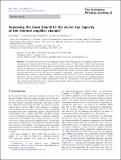Improving the lower bound to the secret-key capacity of the thermal amplifier channel
Author(s)
Wang, Gan; Ottaviani, Carlo; Guo, Hong; Pirandola, Stefano
Download10053_2018_Article_90351.pdf (632.3Kb)
PUBLISHER_CC
Publisher with Creative Commons License
Creative Commons Attribution
Terms of use
Metadata
Show full item recordAbstract
We consider the noisy thermal amplifier channel, where signal modes are amplified together with environmental thermal modes. We focus on the secret-key capacity of this channel, which is the maximum amount of secret bits that two remote parties can generate by means of the most general adaptive protocol, assisted by unlimited and two-way classical communication. For this channel only upper and lower bounds are known, and in this work we improve the lower bound. We consider a protocol based on squeezed states and homodyne detections, in both direct and reverse reconciliation. In particular, we assume that trusted thermal noise is mixed on beam splitters controlled by the parties in a way to assist their homodyne detections. The new improved lower bounds to the secret-key capacity are obtained by optimizing the key rates over the variance of the trusted noise injected, and the transmissivity of the parties’ beam splitters. Our results confirm that there is a separation between the coherent information of the thermal amplifier channel and its secret key capacity.
Date issued
2019-01Department
Massachusetts Institute of Technology. Research Laboratory of ElectronicsJournal
European Physical Journal D
Publisher
Springer-Verlag
Citation
Wang, Gan et al. "Improving the lower bound to the secret-key capacity of the thermal amplifier channel." European Physical Journal D January 2019, 73 (January 2019): 17 © 2019 The Author(s)
Version: Final published version
ISSN
1434-6060
1434-6079